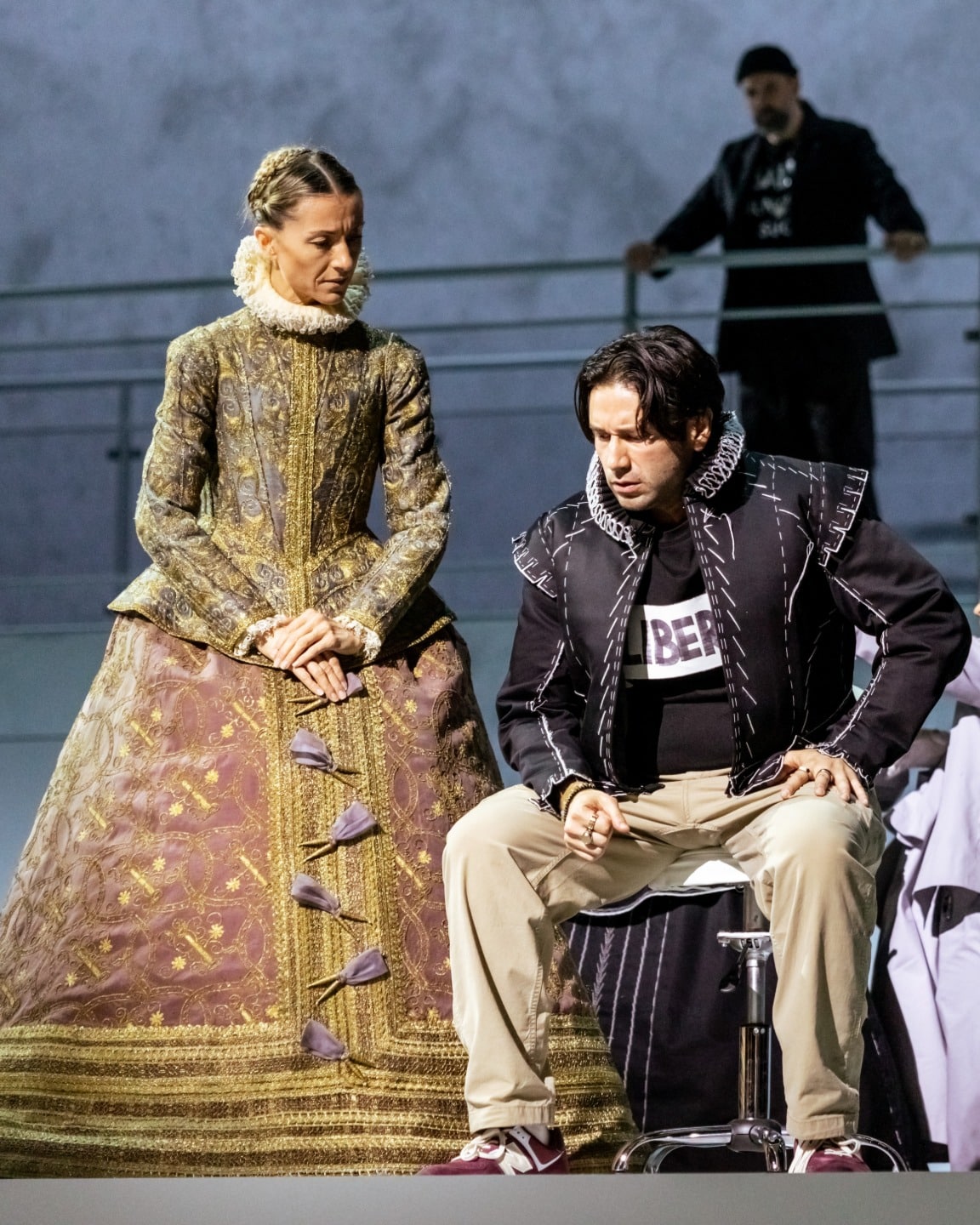SanFran Symphony has lost one-fifth of its players
NewsAn investigation by Janos Gereben and Lisa Hirsch at SF Classical Voice reveals that 27 musicians have left the San Francisco Symphony under Esa-Pekka Salonen since 2020. There are 28 vacancies in the ranks and no rush to fill them. Most nights the orchestra plays with 20 freelancers, or more. One departed player says this ‘kind of sudden exodus cannot occur without damaging the sound, unity, and perfection which took years and years to build.’
Read the full report here.






Saying 27 musicians “have left the San Francisco Symphony under Esa-Pekka Salonen since 2020” is deceptive. The report doesn’t insinuate that the musicians have a problem Salonen. It’s a labor dispute between the musicians and management.
22 of them retired. Nothing to do with Salonen. Same for the other five.
when an title here is not deceptive?
According to Lisa Hirsch (one of the authors of the original article):
“You might have seen a notorious classical music site linking to the article and using the phrase “XX musicians have left under Esa-Pekka Salonen,” which is despicable phrasing, implying that somehow Salonen had something to do with this. It’s the orchestra that negotiates musician contracts; it’s the board that’s responsible for making sure the money is there to pay the musicians appropriately; it’s the board and orchestra that apparently offered some financial incentives to encourage retirements. Salonen, as I hope the article makes clear, has no responsibilities in these areas.”
https://irontongue.blogspot.com
I have recordings of the Columbia Symphony under Bruno Walter, made of largely of freelancers and the orchestra sounds amazing. Perhaps the turnover is a good thing.
Wasn’t th Columbia Symphony mainly LAPO in disguise?
I understood from a hornist- cum-conductor that there was actually an east and west coast Columbia Symohony, indeed of either LA Phil and studio musicians, or New Yorkers.
The level of ensemble refinement is severely lacking in many Bruno Walter Columbia Symphony recordings. The performances are heartfelt and sympatico but the playing is not anywhere near to the standard we have come to expect today. Attacks are imprecise. Timpani are tubby or inaudible, and the woodwinds tend to be nasal. It’s hard to make fair comparisons with 60+ year old recordings but the performances aren’t in the aggregate anywhere near as good as the best we have today. Still, I own them all, but I don’t reach for them.
Yes , Harding or Zweden, Dudamel or others make Rolls orchestras sound like Toyota when Walter mastery made Toyota orchestra sound like a Rolls…. Different times.
Wrong. The Columbia Symphony on Walter’s records sound sluggish, underrehearsed, undernourished and inhomogeneous. And Walter’s conducting often is sedate.
Spot on. Same with me.
Multiple recent auditions have resulted in no-hires, as well. Salonen does not wield that sort of influence, and at any rate the trend started before his arrival.
There is a false premise repeated in the article, the idea that US orchestras have to offer high salaries to compete for musicians. In reality, it is rare for musicians to leap frog to other orchestras or for orchestras to poach musicians from other orchestras. There are so few jobs and so many good musicians that winning positions is almost like the luck of the draw that then sets up one player for life.
Philly, for example, poached a first trumpet from Dallas. Dallas refused to match the pay, held an audition, and hired someone just as good, if not better.
Orchestras, however, expect vague and impossible standards and sometimes go for years without filling positions. It’s a sham that deeply harms many candidates and also the orchestra itself. The Met orchestra, by contrast, always hires whoever comes in first at their auditions. It hasn’t harmed the orchestra’s quality at all, which is equal to any of the USA’s top symphony orchestras including San Francisco.
Not coincidentally, this sham is also used to demand ever higher salaries leaving cities with one super expensive orchestra when it needs several as in Europe. One orchestra hogs all. LA’s one billion dollar fund-raising campaign of a few years ago is an example. In reality, a metro area that large needs several full time orchestras. It’s the one-percenter mindset of our system of funding the arts by and for the wealthy.
The SFS could fill those 27 positions efficiently and to good effect if it would get off the typical nobody-is-good-enough-for-us high horse and run fair, realistic, responsible auditions.
But of course, they will howl that this is all wrong while carefully watching their pocket books and the marketing construct of their vaunted status. Reality is not their strong suit. Top musicians should be very well paid, but they should not hog resources, especially in a country where funding is so scarce as in the USA.
Well put, thank you. Couldn’t agree more.
I disagree with everyone here. For 48 years I played 5th ventilhorn in E# under this conductor and witnessed many atrocities, such as plucked poultry at the podium and assorted uncouth nasties.
The article does mention two high-profile players that have done trial weeks in Chicago. That could become the norm if this type of friction with management continues.
1, The Met does not require a musician to be hired at each audition.
2, It is not at all rare for musicians to change orchestras. Of the 11 violas currently in the Chicago Symphony viola section, 8 previously played in another orchestra. A significant majority of CSO musicians came from somewhere else.
From inaccurate data come erroneous conclusions.
I’m glad you are sanguine about several orchestras in a city, none of which can support a middle class family. London is a good example of how well that works. Lots of orchestras, and a miserable existence for orchestral musicians. It is odd how many music lovers on this site don’t seem to care much for musicians.
You are the one giving false information. In fact, pretty blatant BS. Here is an ICSOM article by Met musician Elaine Douvas stating very plainly that that they always take the winner of auditions:
“If you win the audition, you get the job—no questions asked, no trial weeks, no ‘nobody was good enough.’”
Everyone can read her report for themselves right here:
https://www.icsom.org/senzasordino/2007/05/whats-happening-to-the-audition-system/
Musicians often jump from *regional* orchestras to a major orchestra, but shifts from major orchestra to major orchestra are rare–as you know full well. I thus note you don’t list any examples of that among the 8 violas you mention. And even if there is an occasional example, they do not define a norm.
The average pay for a ROPA orchestra member is around $13k per year. One doesn’t need a $170k to $200k salary to compete with that. (ROPA is the representative organization for regional orchestras)
London’s orchestra musicians do alright, though they like to exaggerate their problems. They are also not the norm in Europe. Munich, Paris, Berlin, Vienna, Helsinke, Stockhom, etc. are the norm, and the musicians in their many orchestras also do fine.
That’s why the budget of the Berlin Philharmonic is $34 million while LA’s was 125 million in 2019. That’s almost four times higher. And no, health insurance doesn’t account for such a large gap, so don’t try to pull that one either. We should also note that Germany has 130 full time orchestras (way more per capita than the USA) so the competition for musicians is strong.
In Europe, there are also no special contracts for first chair players. We don’t see concert masters in places like Cleveland making over $700,000 per year, or a wind player pulling down over $300,000 while musicians in regional orchestras serving tens of millions of people make about $10k to 15k per year. Those regional orchestras cannot even tour around their states because most of the musicians to have a day job.
It is time for the USA to develop a public arts funding system like every other developed country in the world has, and for our top orchestras to get off their high horses and behave in a more socially responsible manner so that funding is distributed more democratically. This would raise the cultural standards of the entire country. This is all plainly obvious, but our top orchestras live in such hermetically sealed bubbles they can’t face the truth.
Any time any city or state wants to have public funding of the arts, they’re perfectly free to do so.
Based on the state grant agency in the state I live would mean orchestras have the mind set of dead white European males evil you must play the complete works of Florence Price every year.
Mr. Osborne,
I will certainly defer to you on the subject of BS.
1: “London’s orchestra musicians do alright, though they like to exaggerate their problems.” Do you actually know anybody in a London orchestra? I do. It is brutal, unless my friends are all pathological liars.
2: “If you win the audition, you get the job—no questions asked, no trial weeks, no ‘nobody was good enough.’” Yes–If you win the audition, which requires a majority vote. If nobody gets a majority vote, they have no winner. That is why elsewhere in the article she urges people on an audition committee to “trust the majority vote”. The quote you cite deals primarily with probationary periods which the Met does indeed eschew; you misunderstood it.
3: None of the colleagues I mentioned came from regional orchestras. Most CSO musicians had a job in a full time major orchestra before they came here. I personally had won a position in Seattle.
4: American orchestras devote a great deal of their budget to fund raising and outreach, which are not issues in Europe. Only about one third of the CSO’s budget goes to the musicians. The last time I checked, there were more administration and staff employees than musicians in the orchestra. If we were paid nothing, the orchestra budget would still exceed that of our peers in the preeminent European orchestras.
5: I am hardly an expert on European orchestras, though I very much doubt that they all have the same contractual arrangements. Can you cite a source to prove that “In Europe, there are also no special contracts for first chair players”? In all of Europe? From Reykjavik to Sofia? Seriously?
I agree with you about government support. Good luck with that.
1) I know about a dozen musicians who are current or former members of London orchestras. Their pay is lower than EU norms but not as draconian as you suggest. And as already noted, the UK is not the European norm. All over Europe we see cities with multiple orchestras and musicians who live well.
2) Elaine is talking about respecting the majority vote of one’s colleagues. There are 13 votes and no abstentions. There is always a majority, and that person is taken. If you deny that, you’re just making things up!
3) The pay in Seattle is about $60k per year. Chicago doesn’t need $170K to draw those musicians. The cost of living in Seattle, WA is 21.7% higher than in Chicago, IL. Provide us with names and their former orchestras and we will see the same pattern over and over. There are occasionally jumps from major orchestra to major orchestra, but they are rare and do not justify the exorbitant salaries.
4) You confirm my point. The huge “development” departments in US orchestras for cajoling money out of rich people is another reason we need a public arts funding system. It also allows institutions to plan far ahead while US institutions can hardly plan beyond one year because they can never be sure how much money will be coming in. And lest there be any confusion, the pay for EU musicians is not equal to the ridiculous sums paid to top US orchestra musicians. And in regional orchestras, the EU pay is vast better because not all the money is moved to the top.
5. In continental Europe, with rare exception, orchestra positions are civil service jobs, or controlled as corollaries to civil service jobs. Virtually all orchestras are owned and operated by municipal, state, or federal governments. Salaries are defined by civil service regulations, as are supplemental fees based on cost of living differences. There are no special contracts. Orchestras are defined as a public service just like libraries, universities, museums, etc. Here is an article that describes this:
https://www.jstor.org/stable/41810356
If you doubt that, name one regular EU orchestral musician with a special contract.
It will indeed be hard for the USA to move to a public funding system, and even harder when top orchestras have a mindset of hogging arts funding based on wooly,, plainly false information based on shortsighted greed. You are a perfect example.
The UK is not a norm and to focus on it is cherry picking facts. The UK uses a hybrid, Thatcherized funding system that heavily mixes private funding with public funding. It is this privatization that causes their low pay. Here is a 2014 article which put the average pay of UK orchestra musicians at £30,000 ($50,900.) With an inflationary adjustment, that is $64,440 in 2023. The pay in London is a bit higher. (The Independent says 40,000 pounds for the LSO.) This would be low by EU standards, especially for an orchestra that prominent. Thank Reagan and Thatcher’s neoliberalism.
In Europe, the most significant difference appears when looking at the number of regional orchestras and their pay. There are far more of them, and their pay is much better than in the USA. Their job security is also much higher.
The tutti string players of the New Mexico Philharmonic, for example, make about $3000 (three thousand) per year even after 30 years of service. It might be a little bit higher since I last enquired. They serve a metro area of one million and a state of 2 million, though they can’t tour because most of the musicians have to have day jobs. A number of the solo chairs come from our best schools. Meanwhile, the CSO demands $170k to $200k and special contracts for a number of the players.
https://www.theguardian.com/music/tomserviceblog/2014/jun/26/orchestra-salaries-higher-in-america-than-uk#:~:text=In%20the%20salaried%20orchestras%20in,%C2%A330%2C000%20(%2450%2C900)%20mark.
LSO earnings are much higher. Know your facts.
But not equal to the sums paid by the Big 7 in the USA even though the LSO is just as good or better. The lower but still reasonable pay allows for a wider distribution of funds which allows London to have 5 major orchestras.
Why do you LIE about Seattle Symphony Salary being 60k?
Seattle Symphony musicians make much more than $60k base
True, I saw a false stat. The base pay is now about $109k, but that is still a far cry from $170 to $200k per year, a gap that is unnecessary.
Mr. Osborne, you are wrong in thinking that there are no special contracts. When I was working in Italy, all of the Italians had the option of working as civil servants. The foreigners all had special contracts, since they were not allowed to be civil servants, being foreigners. There were also Italians that had special contracts. Why, you may wonder? Because, in having a special contract (which always expired) they could also work (as a civil servant) teaching at a conservatory. Being a civil servant, they could only hold one public job, so they would always choose the conservatory, and negotiate a contract with the orchestra. The foreigners could also negotiate their contracts. There were also musicians that were favored by the conductor who managed to get special salaries and/or early retirement. Not all EU countries work like Germany.
In wich orchestra does Mister Osborne play? Cos fighting and “Besserwissering” with a veteran Chicago Symphony player seems quiet frankly ridiculous and blatantly arrogant.
London musicians don’t exaggerate their problems. It’s basically lack of money. The London orchestras give champagne concerts on beer funding. Imagine what would/could happen with the amount of the L.A. Phil!!
To settle this debate about the MET’s hiring practices: a winner must be chosen provided a final round takes place. The only way they can no-hire is if nobody advances to finals, which I believe is almost unheard of there.
correct
The USA won’t even provide a public funded healthcare system for every citizen like every other developed country; what makes you think it’ll do that for the arts?
Certainly not true in the trumpet world. Atlanta symphony appears to be a AAA league team with players constantly moving up to the majors.
Yes, Atlanta sends musicians up the food chain. And to the point, that would happen even if there were not such a wide gap between its pay and the Big 7. Also to the point, players in the Big 7 don’t often go to another Big 7 orchestra. Sometimes, but not often, so to say the Big 7 need to constantly compete with their salaries is false.
Unfortunately, this isn’t really possible since orchestra audition committees qualify candidates for the Music Director’s final approval and hire. You can’t “force” this committee to pick someone if they don’t like their playing. SF went almost ten years without hiring a first horn!
The situation is possibly worsened by the rapidly increasing cost of benefits. Management don’t have to offer them to freelancers. Also, in an uncertain financial future, the orchestra management probably feels it’s prudent not to hire musicians on (long-term) contract.
I’m not sure whether the sound of the orchestra is greatly affected by the inclusion of a great number of freelancers, but it certainly does affect the future prospects of orchestral musicians who want to make orchestral playing their career.
I take some of the points made in other comments, but is Salonen really a top-line conductor anyway? His UK debut was a last minute Mahler 3 with the Philharmonia in the 1980s, I recall. I have many excellent MTT/SFO recordings in my vast collection but none of Salonen’s. Am I missing something?
Yes you are. He is a fine conductor with many excellent recordings from several major ordhestras.
Yes, and yes.
No, you aren’t. Before retirement I was frequently in Los Angeles and attended concerts at the Chandler Pavilion and in the Disney Hall. They always sounded better under guest conductors than Teflonen.
MTT + Mahler = Boring
For an old man in the west, yes.
Orchestra was never in the top category, they are good on some older recordings, from what I hear have fallen off a lot. Hall is falling apart, Salonen is a snoozefest both as a conductor and a “composer” (lolol) Rather go to LA
Varietas delectat. To each their own. I regard Salonen very highly as both composer and conductor.
LA Phil players have tremendous affection for him. This is obvious just by listening to them play when Salonen is in town, or by looking at their social media accounts.
Leor Maltinski for one- is a rank and file violin in the SFSO- & he’s an incredibly gifted fiddle player- a virtuoso- actually should be a major soloist- having won numerous international competitions. He plays like Heifitz & is in an orchestra- go figure that!
Salonen is way more interesting than the slick Dude, and his programs are too. Great composer, too. The SFS became one of the greatest orchestras in the world under MTT
Please go to LA. By the way, the Hall is not falling apart, nor is the orchestra. Do you ever have anything positive to say?
I can’t think of *anything* that happened in 2020 that might have affected the operations of large performing arts organizations, or the livelihoods of musicians. Not a single thing. It was 100% business as usual.
They got a bad contract during Covid that lasted much longer than their peer orchestras. Isn’t their former President who was responsible for this in Baltimore now?
Are they EVER going to get a contract, ps??
As a manager, it makes sense to use extras when possible to keep costs down.
If the orchestra operates in a city where the freelance pool is excellent (like in SF), then you can use local players in vacant section seats, save money, and wait for the economy to recover from the Pandemic.
If the alternative is to hire tenured players and then run deficits, the current tenured players will be the ones hurt when it comes time to negotiate a new contract.
Batten down the hatches, hold to a high level of music making, and see where things are once a contract is reached and a three year strategy is in place.
There were many players from the Ozawa and DeWaart era who retired..San Francisco has a long story about taking time for filling vacancies.
Does the poor state of San Francisco as a city deter recruitment to the orchestra?
No
As bad as it sounds it’s not very unusual, the “retirement” exodus always seems to happen in waves, it’s almost like the people wait for another to retire so they don’t retire first or alone. As someone who’s very familiar with CSO, they currently have at least 15 openings (4vln, 3 vlas, 2 cellos, oboe, b clarinet, contra basson, ass trombone*, harp, librarian) 4 further announcements have been made to retire either during or after next season, and few others are rumored. In addition to that, up to 8 players are currently on probation or will be starting next season, so their openings are still technically there if they don’t receive tenure. Bring that all together and you have 27 positions as well.
The CSO SHOULD have a principal trombone opening as well. ☠️️
That one is actually rumored, a CSO cellist friend of mine mentioned to me not long ago that Friedman told him he might retire after the European tour, but I’m sceptical since that’s barely half a year away
European tour 20 years ago? That would have been the best time for him to retire..
Shame such a “top 7 “ orchestra with the most famous brass sounding like they do…
The current principal harpist of the Milwaukee Symphony seems to guest in that role with the Chicago Symphony on almost any and every concert when she is not needed in Milwaukee. She’s been doing it for a couple of years I believe
@Old Man in the West….. Take your ear plugs out!